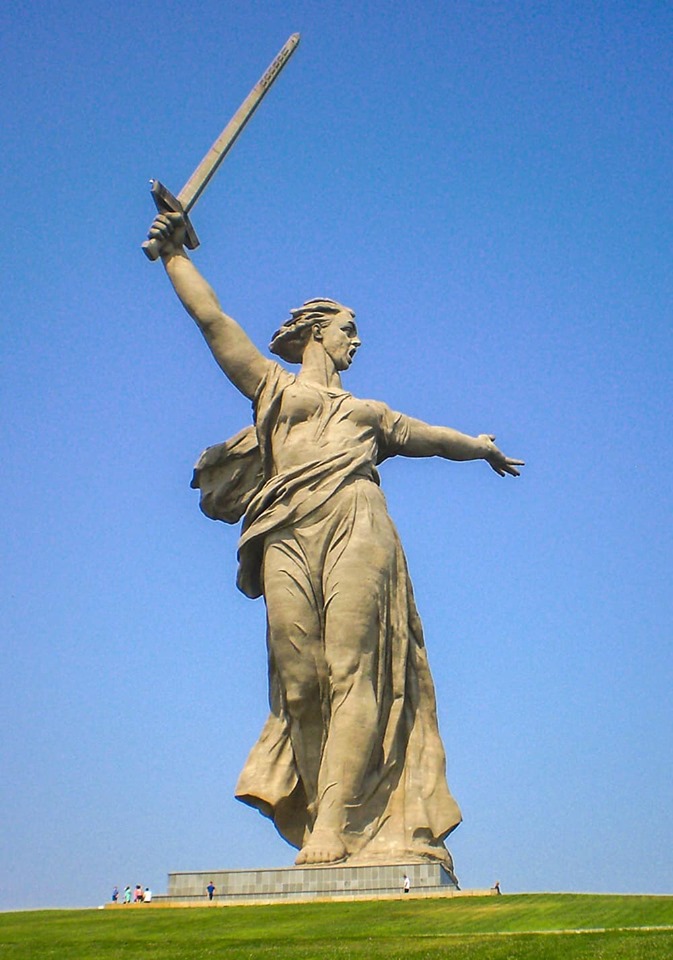There are no products in your shopping cart.
| 0 Items | £0.00 |


By Ayo Akinfe
(1) Today is October 15. On this day in 1967, the tallest statue in Europe was unveiled in the Soviet Union. Named the Motherland Calls, it was also the tallest statue of a woman in the world. This edifice was erected as part of a memorial complex in Volgograd that commemorates the Battle of Stalingrad during World War Two. Designed by the sculptor Yevgeny Vuchetich and engineer Nikolai Nikitin it stands 85 meters high
(2) I suspect the Soviets timed the unveiling to coincide with the fact that it was also on October 15 1924 that US President Calvin Coolidge declared the Statue of Liberty a national monument too. Designed by French sculptor Frédéric Bartholdi, with Gustave Eiffel designing and building the interior metal framework, the Statue of Liberty was completed in France before being disassembled and shipped to America in 1885. It was then reassembled on what was then called Bedloe Island (now Liberty Island) in New York Harbour and dedicated by President Grover Cleveland in 1886
(3) Nigerians should consider this an eye opener. In 1886, the US could not even complete a statue and were dependent on European know-how but alas, by 1940, Europe was dependent on the US for manufacturing World War Two equipment. In 1960, we were dependent on Europe to manufacture almost everything but hey, by 2019, for every product they supply us, we should also be manufacturing for export to them
(4) This for me is where we need to learn the lessons of the Battles and Stalingrad and Leningrad. World War Two turned at Stalingrad when the Red Army expelled the Germans from the city and drove them to the borders of Russia and Ukraine at Kursk. The whole world was shocked to find out that these primitive Slavs could defeat the almighty Wehrmacht on the battlefield
(5) In what was the largest and bloodies battle in the history of warfare, the Red Army shattered the myth of the invincibility of the Wehrmacht, capturing about 91,000 German prisoner including 22 generals and Field Marshal Friedrich Paulus. Once word leaked out, uprising against the Nazis broke out all over Europe. In Warsaw in particular, the Polish Jews were unbelievably heroic. They took up arms against the Germans and fought with unprecedented courage
(6) In Leningrad, the battle was even more heroic as for 872 days the city was under seize and cut off but alas, it fought on stoically. The blockade became one of the longest and most destructive sieges in history and possibly the costliest in casualties suffered. Some historians classify it as genocide. After the war, 1,496,000 Soviet personnel were awarded the medal of honour for the defence of Leningrad from 22 December 1942 of until June 1944
(7) As many as 1.5m soldiers and civilians died in the city of Leningrad during the 900-day siege. Also, of the evacuated 1.4m women and children, many of them died during evacuation due to starvation and bombardment
(8) How Leningrad survived is still beyond me as civilians in the city suffered from extreme starvation, especially in the winter of 1941–42. From November 1941 to February 1942 the only food available to the citizen was 125 grams of bread per day, of which 50% to 60% consisted of sawdust and other inedible admixtures. admixtures. In conditions of extreme temperatures of 30 °C and with city transport out of service, even a distance of a few kilometres to a food distribution kiosk created an insurmountable obstacle for many citizens. Deaths peaked in January–February 1942 at 100,000 per month, mostly from starvation
(9) Despite these terrible odds, Leningrad survived. It is this spirit that is lacking in Nigeria. A little bit of discomfort and we throw in the towel rather than look for solutions. If we had the Leningrad spirit, by now, we would have found private solutions to our power crisis, kidnapping, the Fulani herdsmen menace, etc and many of our pressing problems. Unfortunately, Nigerians have it in their collective heads that there is a rule book somewhere which says the government must solve all their problems
(10) Let me just give you an insight into the problem afflicting Nigeria. October 11 was the International Day of the Girl Child. Not one of the Nigerian old girls associations deemed it fit to organise a seminar or workshop to discuss the matter. For these female alumni associations, they are there to fraternise, organise social events, wine and dine. Protecting the vulnerable Nigerian girl child and guaranteeing her education is very much a secondary matter, way down their list of priorities. They were waiting for the government to organise a summit. I say shame on them